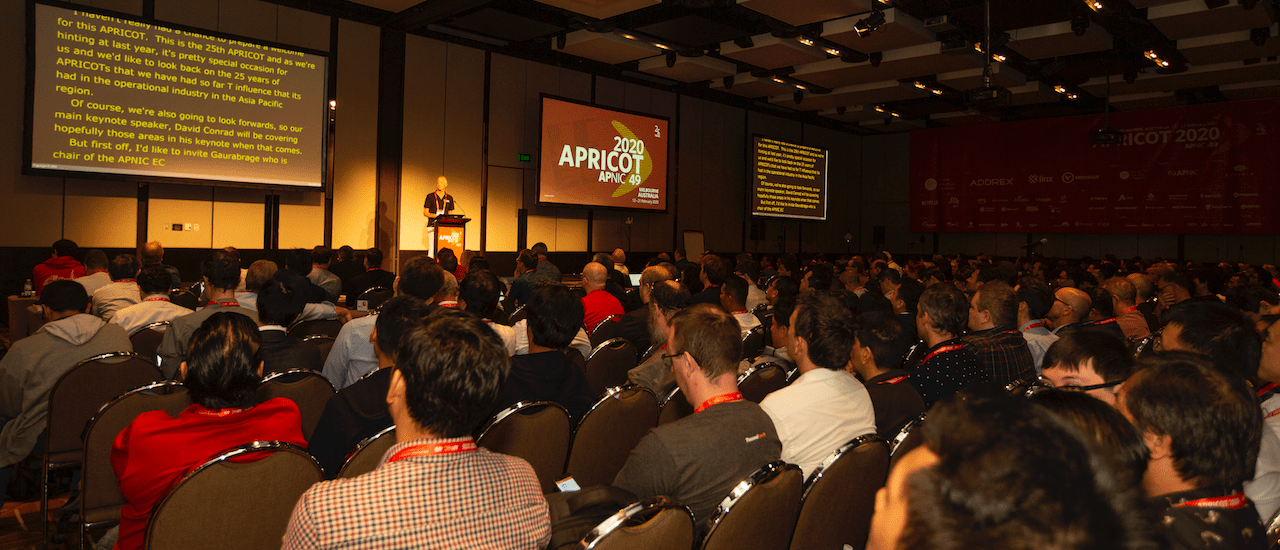More than 600 of the world’s leading Internet engineers from 60 economies gathered last week at APRICOT, and it was encouraging to see routing security take center stage in the largest meeting of the technical community in the region.
The Internet Society is a long-time partner of the annual event, also called the Asia Pacific Regional Internet Conference on Operational Technologies, and this year we held two community gatherings, spoke in several sessions, and ran a booth throughout the conference.
The ten-day meeting consisted of workshops, tutorials, conference sessions, birds-of-a-feather sessions, and peering forums from 12-21 February in Melbourne, Australia. This year marked the 25th anniversary of APRICOT, and it was good to recognize how the event has grown over time and contributed to technical capacity building in the region. It also gave me the chance to reflect on my own participation in the event over the years, including from when I was in the private sector prior to my current role.
One of the things Internet builders get together for at APRICOT is to share the technical knowledge needed to run and expand the Internet securely. So it was a great opportunity to bring attention to the Mutually Agreed Norms for Routing Security (MANRS) initiative, one of the eight projects outlined in the Internet Society’s 2020 Action Plan.
That was why our booth was dedicated to MANRS, and we were glad to see many attendees who ran networks come over to have a routing security check-up of their networks’ routing hygiene. The initial test is a first step towards strong and robust routing security, and we are hopeful many of them will join our growing community. Our MANRS t-shirts also proved very popular!
Aftab Siddiqui, our Senior Manager, Internet Technology for Asia-Pacific, was one of the facilitators of the highly popular Resource Public Key Infrastructure (RPKI) Deployathon, in which about 40 network operators learnt to deploy RPKI, a framework to sign Internet routes and protect users from route hijacks and misconfigurations.
Aftab was also appointed Chair of the inaugural APNIC Routing Security Special Interest Group (SIG), a new SIG that will provide a platform to discuss the operational issues and best practices to secure global Internet routing. We look forward to him helping strengthen routing security even further with Co-Chairs, Dr. Di Ma and Rupesh Shrestha.
We got together with more than 40 MANRS participants and partners in the region at the Community Meeting to share the latest on the initiative, including a plan to include new kinds of organizations, such as content delivery networks (CDNs) and cloud providers. Stay tuned for future updates!
In the long run, we aim to make MANRS a norm in routing operations – with non-conformance seen as unacceptable – and for it to be a self-governed community. We had a good discussion with the community on this and other matters, and to those who were able to attend, we thank you for taking the time to come.
Our delegation included Robert Maylath, Senior Director, Organization Membership; Kevin Meynell, Manager, Technical and Operational Engagements; Adrian Wan, Policy Advocacy Manager; Aftab; and myself. We outlined our plans at the AP Star Retreat and the APNIC Global Reports session alongside many of our partners and encouraged the community to join us in our mission.
It was good to see that more than 40 people from our membership community, including the local chapter, were able to join us for a social get-together. We were given a glimpse of the threats the Internet is under in Australia by Paul Brooks, Chair of the Australian Chapter, who told us he and other Chapter leaders would take part the next morning in a public hearing of the Independent National Security Legislation Monitor Review of the Telecommunications and other Legislation Amendment (Assistance & Access) Act 2018, commonly known as the TOLA Act, to stand up for encryption.
If you could not make it to APRICOT this year but wish to catch up on the sessions, you can watch the recordings or read the transcripts on the conference website, and download the presentations.
Next year, APRICOT is scheduled to run from February 16 to 26 in Manila, Philippines.
Image courtesy of APNIC

